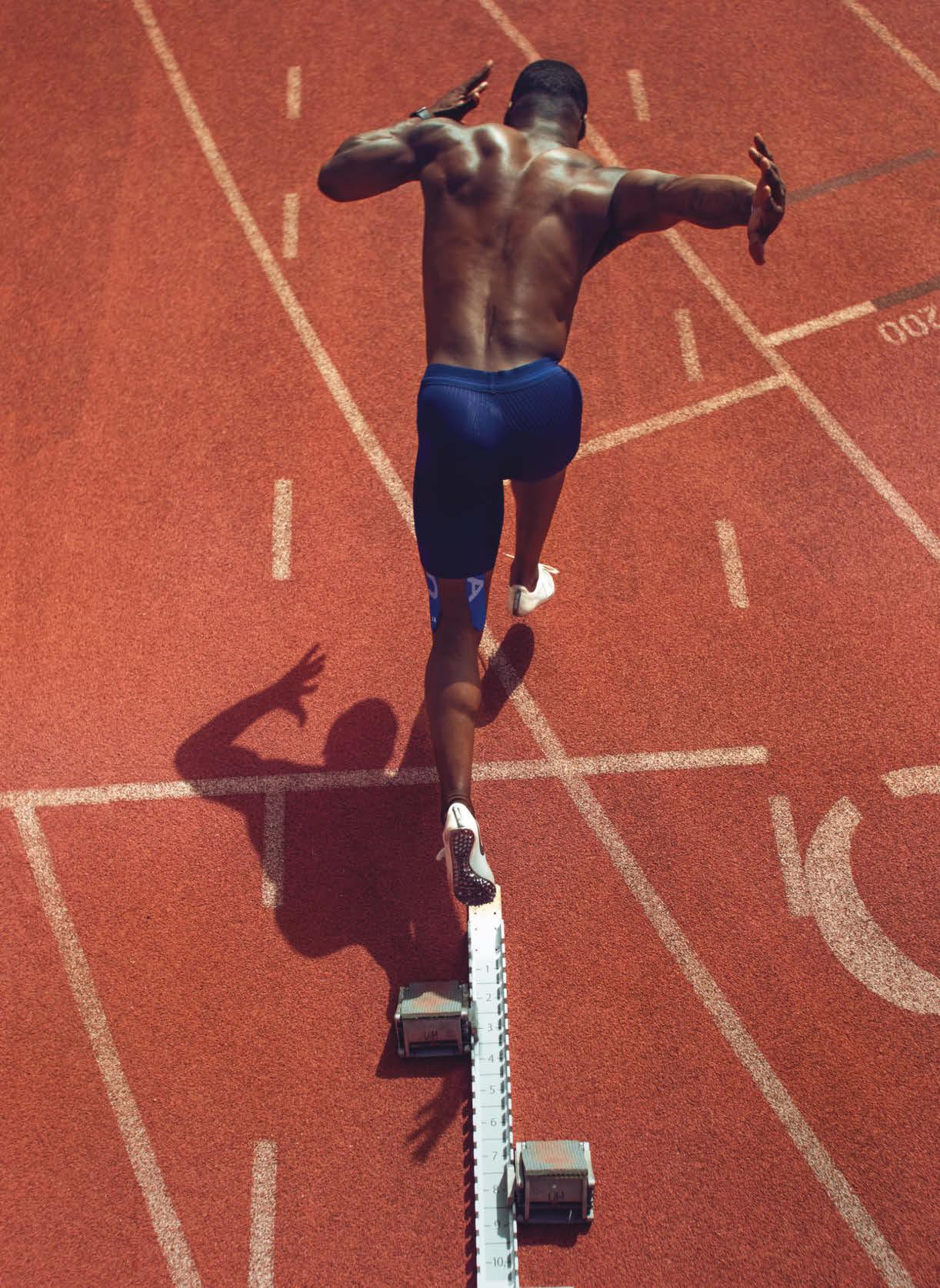
17 minute read
Double Quick
DOUBLE
Sprinters Elijah Hall and Cameron Burrell are old friends, longtime training partners and fierce competitors. They’re hoping to visit Japan together this summer.QUICK Words MAURICE BOBB Photography BRIAN LOWE
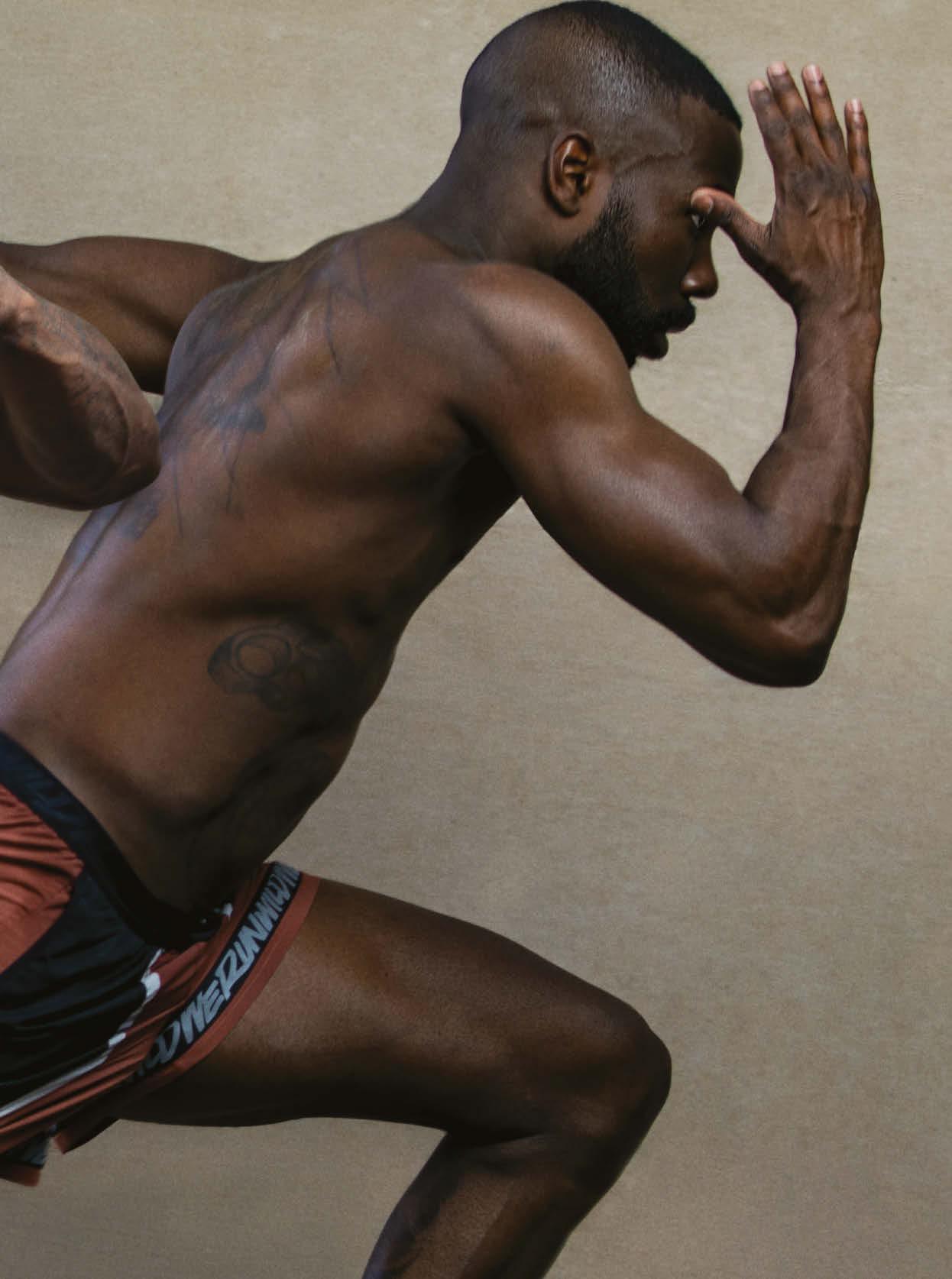
CONSIDER SOME OF THE MOST ICONIC SPORTS MOMENTS IN HISTORY.
Babe Ruth’s much-debated “called shot” during Game 3 of the 1932 World Series against the Chicago Cubs at Wrigley Field, for example. Joe Namath’s guarantee against the heavily favored Baltimore Colts before Super Bowl III. Larry Bird’s “Who’s coming in second?” taunt to his fellow competitors before the Three-Point Contest in 1988. Or Anthony Joshua’s “victory is written all over me” guarantee after his pubic workout at Wembley Arena before beating Wladimir Klitschko to unify the WBA and IBF boxing heavyweight titles in 2017.
Even the not-so-subtle gold cleats Michael Johnson had custom made before running the unprecedented combination of the 200 and 400 meters in the 1996 Olympic Games in Atlanta.
It wasn’t just that they’d stepped up to win their respective championships; it was how they added to their mythology by backing up their bold predictions.
Elijah Hall, a 26-year-old professional sprinter still racing toward his own legend, remembers his own prophetic moment like it was yesterday.
It was during his senior year at the University of Houston. The men’s track team was at their hotel in Eugene, Oregon, eating breakfast before the 2018 NCAA Championships, when, like a vision, Hall had the idea that he and his relay teammates would do the impossible later that day: break the collegiate record in the 4x100m.
But unlike the Sultan of Swat, Broadway Joe, Larry Legend or the Man with the Golden Shoes, there was no hubris in Hall’s bold prediction. He

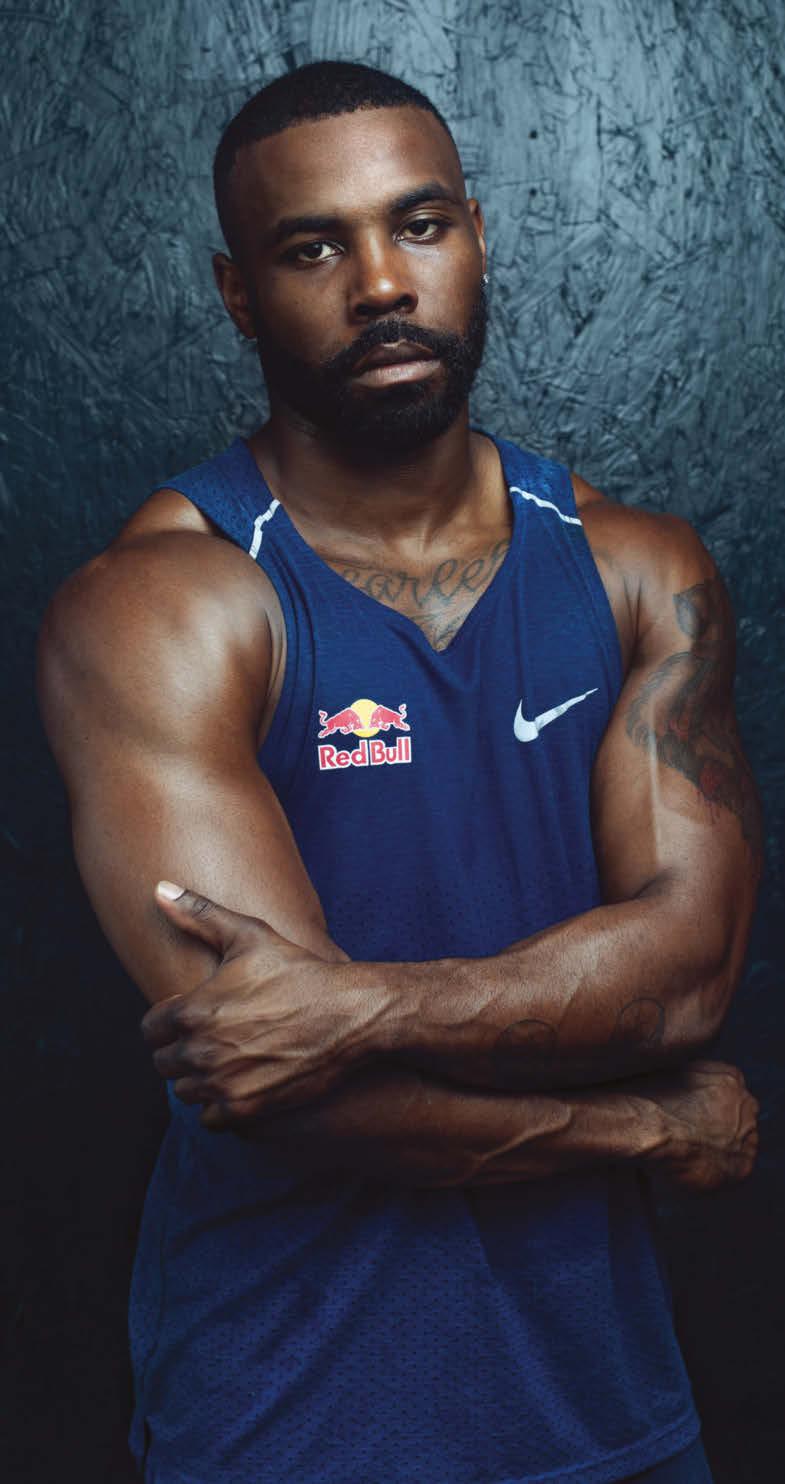
Elijah Hall (left) and Cameron Burrell were photographed in Houston on March 22.
was simply filled with the confidence of preparation, which prompted him to write down the time 38.19 on a napkin. “This is the time we’re going to run today,” he said matter-of-factly.
His teammate and longtime friend, Cameron Burrell, understood the audacity of Hall’s statement, knowing that the Texas Christian University men’s team had held the collegiate record in the event since 1989 with a time of 38.23. “That’s fast, but ... OK,” Burrell said.
The weather that day was not optimal. It was a chilly 60 degrees and there were dark gray cumulus clouds hovering over Hayward Field bent on postponement. And then it began to rain. Not a torrential downpour, but enough precipitation to make things very uncomfortable.
“That morning we knew the weather wasn’t going to be good,” recalls Burrell, also 26. “It wasn’t record-breaking weather. “But we had something special, we had some momentum and we believed.”
They also had new uniforms, new shoes and a fresh pep talk from track and field legend Carl Lewis, who is now in his seventh season as Houston’s fulltime assistant coach under head coach and fellow former world’s fastest man Leroy Burrell.
As the anchor leg, the younger Burrell was able to watch the race unfold before his eyes. He couldn’t believe what he saw unfolding. It was an electric performance by all runners.
“John Lewis ran the race of his life,” Burrell says. “Eli gets the baton, adjusting it while running, but at the
same time, he’s blowing people out and I’m like, this is a joke, you gotta be kidding me. He made a clean exchange to Mario Burke, and at that point I ducked down and got in my three-point stance and I just ran with the spirit and just let it go. And when I crossed the finish line and looked at the clock—it said 38.17.”
“That was one of my proudest moments,” Hall adds. “To run on the same team with Cam and before we both left we broke a record that stood for 29 years. We really did that, on the biggest stage in college.” N othing bonds athletes quite like winning together. Burrell and Hall began their friendship as children, running together for the Carl Lewis Athletics Stars Track Club in Houston.
“Funny story is, at the time, Cam and I weren’t the fastest kids at a young age,” Hall says. “But once we got to eighth grade, we started to make that pop out. Everyone was like, ‘These guys are really fast.’ And when we got to high school, we were pretty much winning everything in summer track. Either I was anchor leg or he was anchor leg, but we were always on the same relay team, and that’s how Cam and I formed a bond growing up.”
Burrell and Hall’s alliance spilled over into high school, even though they went to schools in different divisions. “Eli and I have won at every stage of our careers,” Burrell says. “We won the Junior Olympics when we were kids and in high school we were both state champions in Texas. I was the 4A state champion, because I went to a smaller school, and he was the 5A state champion. Over the years we’ve built a bond that instills a comradery that can’t be broken. We’ve continuously built off of each other.”
Hall’s dream to compete at the University of Houston took a detour to junior college due to fatherhood, but he did the work to get back on track.

Burrell, the son of two Olympic champions, has always seemed destined for sprint greatness.

After high school, though, both sprinters charted very different paths. Burrell was heavily recruited out of Ridge Point High School but ultimately decided to run for his father at UH. “I went through the same recruiting process that every recruit goes through in this country,” says Burrell, who as a child was always aware that his parents were track and field royalty because his mother, Michelle Finn-Burrell, and father both have gold medals from the 1992 Olympics as part of the women’s and men’s 4x100m relay teams, respectively. “They came to my house, I got phone calls from rival schools, I explored. But I knew the best thing that was going to happen for me was staying here. Not necessarily because I’d be comfortable, but because I know at the end of the day they have my best interests at heart.”
Most track and field fans would feel as if running for Houston was Burrell’s birthright, especially considering that his father and godfather ran the program, but it was about more than that. “It was more so a business decision,” Burrell says. “There’s a lot of bad coaches out there. And when I say bad, I mean if a coach’s mind is only on the NCAAs and only on the conference and that’s what they want out of these athletes, it’s bad. A lot of athletes struggle with that because they sign with these big schools without realizing that these coaches, in the grand scheme of things, are employees trying to keep a job. And I knew at Houston it could be better for me.”
Hall was also highly sought after by the nation’s best colleges, coming out of Morton Ranch High School in Katy, but unlike Burrell, his grades weren’t up to par. So he had to take a detour.
“Out of high school, the talent was there,” says Hall. “I ran the No. 1 time in the 200 meters in the nation [20.60], but because I had three kids [Alaiya, Taliya, Elijah Jr.] by the time I finished high school, the focus in class wasn’t there. It was hard trying to overcome
growing up as a teenager with kids, and it was a struggle to make the grades I needed. So I had to go to junior college.”
Butler Community College in Kansas was a long way from home—and even farther from where Hall wanted to be. That said, he says now that it was the “do I really want this” moment he desperately needed.
“Junior college humbled me because at the time I was a young kid who wanted to be older and it really made me take a step back and settle down,” says Hall. “I had to focus in class and I had to get my grades right, so I could get into any Division 1 school I wanted, which was the University of Houston.”
Still, Hall says, he wouldn’t change anything. “I feel like that journey made me who I am today. It made me the man I am today because being in junior college is another level. You have to be built for junior college. A lot of people go into junior college and don’t make it out because it’s different. That’s why I salute everyone that goes into juco and makes it out, because I know the struggle. I know it’s hard.”
They say that those who can’t, teach. But what about those who win at the highest level and then choose to pass on that experiential knowledge to the next generation? That’s what coaches Burrell and Lewis bring to the University of Houston.
These are no ordinary talents. Burrell has one Olympic gold medal, three medals at the World Championships (two gold, one silver) and broke the world record in the 100 meters twice (9.90 in 1991, 9.85 in 1994). Meanwhile, Lewis has 10 Olympic medals (nine gold, one silver) and 10 medals at the World Championships (eight gold, one silver, one bronze). He’s also set individual world records in the 100 meters, twice (9.92 in 1988, 9.86 in 1991).
Their collective accomplishments are a repudiation of all of the tired sports adages. They did it, so now they want to make sure that the student athletes under their tutelage do it, too.
No wonder Hall worked so hard to get back to Houston. He wanted to learn everything he could from two of the best to ever do it. “I’ve always been fast, but Coach Burrell and Coach Lewis taught me the mechanics side of running,” Hall says. “They taught me how to stay front side, how to get my arms back, how to get my arms up. The thing I learned from Coach Burrell is respect the body. If you don’t respect your body, the only person you’re going to hurt is you.”
Carl Lewis was a big influence, too. “Coach Lewis instilled in me the right way to run,” says Hall. “He was just always about doing it the right way. Once you learn the right way to run, then training can be easier and running track meets will be easier. Everything is easier when you run the right way.”
Learning those fundamentals paid off big time for Hall. By the time he graduated from Houston, he’d made an indelible mark as a new breed of runner, with a lot of hardware in the school’s trophy case. Hall remains the school record holder for the Indoor 200m and 4x400m relay. He also won the American Athletic Conference Outdoor Championship in the 100m and 200m, as well as the 4x100m and 4x400m relays.
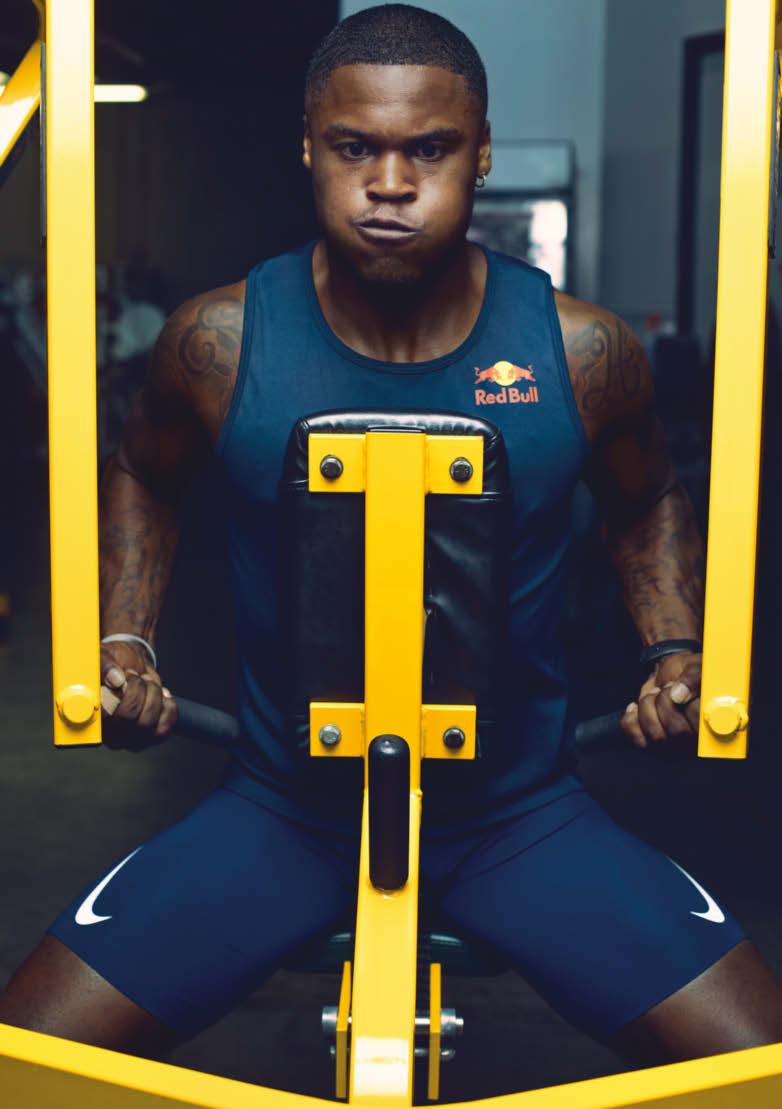
The former AAC Most Outstanding Track Athlete made the most of his two years at Houston, especially when it comes to life off the track. “Coach Burrell and Coach Lewis helped me grow into the man that I am today, because they were like father figures to me, too,” he says. “They taught me to be more responsible about things that go on in my life on and off the track.”
The younger Burrell spent five years at Houston but had the unique benefit of having had access to his father and godfather for his whole life. He was also successful as a collegiate athlete, setting school records in the 60m, the 100m and the 4x400m relay. He also ran anchor for Houston’s 4x100m relay team that won NCAA Championships in 2017 and 2018. In short, it’s an early sprinting career that anyone would envy.
But that’s the least of what he gained as an amateur sprinter and son of the man who broke the 100m world record twice. “My dad taught me resiliency,” Burrell says. “He’s been through a lot in his life, a lot in his path as a young adult and as a coach, but he never quit on himself, he never hung his head. He still doesn’t. When things get hard he gets more determined, and it’s one of those things where he didn’t necessarily have to teach me, he just did it and I caught along to his behavioral patterns. I was like, ‘OK, this is how you operate within this world and this sport,’ and I took note of that mentally when I was young, and because of that, I was able to accomplish a lot.”

In separate workouts, Hall (facing page) and Burrell show a shared work ethic and hoist a lot of heavy metal.
As for the man who won four gold medals in 1984? Without a doubt, Lewis taught his godson how to be a fierce competitor. “Carl is a huge competitor, his brain is his superpower,” Burrell says. “No matter what, he was going to find a way to win. And so I get a good combination of both. I get the resiliency from my dad and the competitiveness from Carl. Carl taught me how to be a genuine life competitor and how to go out and be better than the next man.”
Every 100-meter race is divided into four different phases: start, acceleration, transition and maximum velocity. Hall trains to pursue a mastery of those phases to a point where it all ties together and becomes second nature. “When I get into the starting blocks, I visualize myself running my race,” Hall says. “I see myself running the perfect race. I get down, I take a deep breath, I zone in, look down my lane and rest on the fact that I’ve prepared for this moment and the only thing that can stop me is me.”
When the starter pistol is fired, Hall’s mind goes blank and all he can think is GO. “When that gun goes off, I’m staring that finish line down,” Hall says. “I’m not looking side to side, I’m not looking backwards, I’m not looking at anyone’s feet. I’m looking at the finish line, and I’m trying to get there before anyone else.”
In his mind, Hall’s race doesn’t begin until he’s 50 meters in. That’s when he knows where he’s at in the race and has an idea of how he’s going to place. And the last 40 meters? That’s when he focuses on his form and zeroes in on what he needs to do to finish the race strong. “My thinking is, I’m not going to let the next man beat me,” Hall says. “And if he wants to beat me, he’s going to have to break a record on me.”
Burrell sees sprinting like a chess game, thinking several moves ahead to run the perfect race. “I talk to myself when I run,” Burrell says. “I know what’s right and what’s wrong. I know what I’m doing. I know I need to gradually accelerate. I know I need to stroke my arms. I know I need to put my feet down. I know I need to open up. I know I need to turn over. I’m in a constant state of knowing what I’m doing.”
For most elite 100m runners, those 10 seconds or less can seem to stretch out to a minute. “Really, really brilliant athletes can slow things down,” Burrell says. “Your brain slows it down. It’s a powerful tool. You consciously slow time down to check your body, your posture, your positioning, your acceleration, your turnover, and it’s all happening simultaneously. It’s brilliant when executed properly.”
All of those moving parts require a level of mental acuity that few athletes possess. “I do think track is very technical, but I also think it has a lot to do with the brain,” Burrell says. “You can get into the science and the anatomy of the body and you can get into strength, agility, explosiveness and all that stuff, but I think it starts with your brain. That’s the biggest thing my coaches instilled in me, because technique can be fixed. Arm swings can be fixed. Block starts can be fixed. Endurance can be fixed. But if you don’t have a sound mind, you’re wasting your time.”

Track and field royalty Carl Lewis (far left) and Leroy Burrell (far right) are coaches at the University of Houston program known as Speed City and continue to guide the young sprinters.
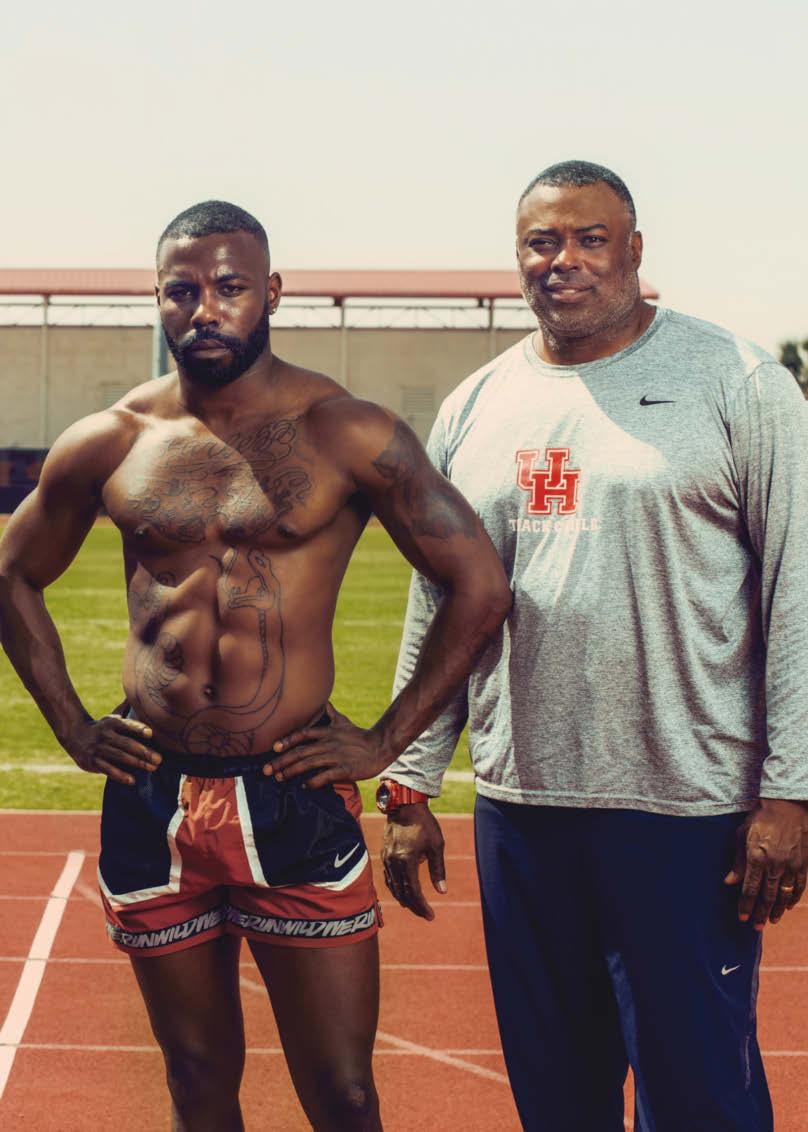
Every four years, the Olympics have a way of capturing the world’s imagination. But what about the years in between? More often than not, athletes have to toil in anonymity as they prepare to compete on the world stage for what they hope will be immortality.
“It’s always been my ultimate goal to make it to the Olympics and stand on that podium,” says Hall, who aspires to compete in both the 100m and 200m. “Representing my country means a lot to me because I have family members that fought and gave their all for this country. I feel like we as athletes have a duty to represent our country the right way.”
Hall understands the spirit of the games, but to make it to Tokyo, he’ll have to dig deep and deliver at the U.S. Olympic Trials in June.
Luckily for him, he has a lifelong teammate and opponent in Burrell. “Eli and I have a relationship built on sheer and utter competitiveness,” Burrell says. “The way it works is interesting because we strengthen each other’s weaknesses. We are each other’s kryptonite.”
“Eli was a very profound and excellent 200m sprinter, I was not,” Burrell continues. “I had a very explosive block start and was an explosive 100m sprinter, he was not. He would beat me in the longer races and I would beat him in the shorter ones. We would run relays together; I would be first leg, he would be last leg. And just over the years, we’ve got better and better at each of our weaknesses and whatever one of us was lacking, the other would pick up.”
One of Hall’s admitted weaknesses is his start out of the blocks, so he spends countless hours shoring up his technique. “The real work is done when you’re alone practicing and no one is looking,” Hall says. “It’s done when there is no audience and there are no cameras. That’s when you get the best and the most out of yourself. I love the bright lights at the track meet because I know for sure that I put in the work at practice. Practice is when you ‘get it in out the mud.’ But if you are prepared and put in the right work, when it’s time to race, you’ll be having fun.”
Like his father, Burrell has already broken the 10-second barrier for 100m, running 9.93 seconds in the prelims at the 2017 NCAA Championships. “My first time breaking the barrier was a school record at UH and then the next year, I did the same thing twice,” Burrell says. “So now I know what that feels like and I know what it takes to get there.”
But Burrell is hardly satisfied. “I want more, I want to get to 9.8. So now we’re doing that kind of work.”
With so much success between them, many observers think Burrell and Hall may both find a way to wear the red, white and blue this summer while blazing down the track to Olympic glory.
“Eli and I are both NCAA champions,” Burrell says. “There is no reason why we can’t do the same thing now as professionals. Eli and I have had the luxury and the privilege of being able to do this at a high level for a very long time. And over the years, we’ve just constantly made each other better and have found ways to inspire each other. No matter where we come from, no matter what we do, no matter what we think, we’re able to push each other. It’s like a Superman and Batman relationship.”
Burrell, who is particularly explosive out of the blocks, has a personal best of 9.93 seconds in the 100-meter dash.

Hall, known for his top-end speed, has clocked a best of 20.02 seconds in the 200-meter dash.
